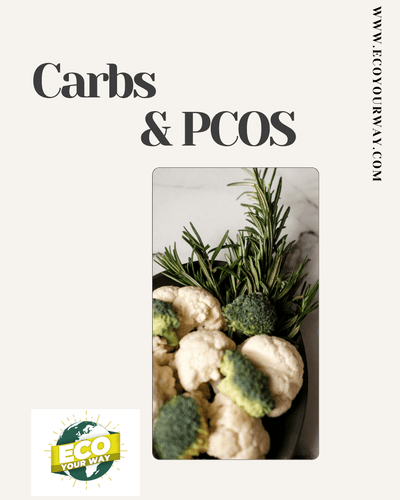The Truth About Carbs & PCOS - Why You Shouldn’t Cut Them Completely
Jun 2nd 2025
Rundown
Understanding PCOS & Insulin Resistance
Why Carbs Are Essential for PCOS Management
- Insulin Resistance and Carbs: It’s About Quality, Not Quantity
- Carbs Support Hormonal and Mental Health
- Fiber-Rich Carbs Aid in Weight and Appetite Regulation
- Provide Sustained Energy
- Improve Gut Health
- Support Weight Management
Best Carbs for PCOS-Friendly Eating
Why Cutting Carbs Completely Backfires
How Eco Your Way’s NERS Approach Supports Healthy Carb Integration
Nutrition
Exercise
Rest
Stress Management
The Takeaway: You Need Carbs - The Right Way
Polycystic Ovary Syndrome (PCOS) affects millions of women of reproductive age and is often associated with insulin resistance, hormonal imbalance, and weight gain. One of the biggest misconceptions surrounding PCOS is that you must eliminate carbs entirely from your diet. While it's true that managing insulin resistance is key, completely eliminating carbohydrates can actually make PCOS harder to manage.
Let’s explore the science behind PCOS and why smart carb choices matter. And how Eco Your Way’s holistic NERS approach (Nutrition, Exercise, Rest, and Stress Management) provides a better, more sustainable strategy.
Understanding PCOS & Insulin Resistance
PCOS often leads to insulin resistance, a condition where your body struggles to use insulin effectively. This can result in higher blood sugar levels, making it seem logical to avoid carbs altogether. However, the right types of carbohydrates play a crucial role in balancing hormones, supporting metabolism, and improving energy levels.
Why Carbs Are Essential for PCOS Management
1. Insulin Resistance and Carbs: It’s About Quality, Not Quantity
Insulin resistance is present in up to 70% of women with PCOS. This means the body doesn't respond effectively to insulin, leading to elevated blood sugar and insulin levels - which then disrupt ovulation and hormone balance.
But not all carbs are created equal:
- Low-Glycemic Index (GI) carbs such as quinoa, oats, sweet potatoes, legumes, and non-starchy vegetables - digest slowly, causing fewer blood sugar spikes.
- Studies show low-GI diets can improve insulin sensitivity, reduce testosterone levels, and support menstrual regularity in women with PCOS.
Instead of eliminating carbs, choosing the right ones is key.
2. Carbs Support Hormonal and Mental Health
Carbs, particularly complex carbohydrates - help regulate cortisol and insulin levels, preventing blood sugar spikes and crashes that can worsen PCOS symptoms.
Carbohydrates help regulate serotonin and cortisol - two hormones that directly affect mood, energy, and stress. Too few carbs can increase cortisol (your stress hormone), leading to inflammation and worsening PCOS symptoms.
Plus, drastically low-carb diets can disrupt thyroid function, slowing metabolism and compounding fatigue - something many women with PCOS already struggle with.
3. Fiber-Rich Carbs Aid in Weight and Appetite Regulation
Whole-food carbs like fruits, vegetables, and whole grains are high in fiber, which supports:
- Satiety and reduced cravings
- Gut microbiome diversity (linked to lower inflammation and better hormone health)
- Healthy weight management
High-fiber diets are consistently linked with improved insulin sensitivity and fat loss - two key goals in PCOS treatment.
4. Provide Sustained Energy
Cutting carbs entirely may lead to fatigue, mood swings, and brain fog. Instead, consuming low-glycemic foods such as quinoa, oats, and legumes keeps energy levels stable
5. Improve Gut Health
Many whole-grain and fiber-rich carbs support gut health, which is closely linked to hormonal regulation and inflammation control in PCOS
6. Support Weight Management
Contrary to popular belief, cutting carbs drastically may lead to unhealthy binge-eating cycles. Instead, choosing nutrient-dense carbs supports satiety and helps maintain a healthy weight.
Best Carbs for PCOS-Friendly Eating
Not all carbohydrates affect insulin the same way. Here are PCOS-friendly carbs that promote better health:
- Whole grains (brown rice, quinoa, buckwheat)
- Legumes (lentils, chickpeas, black beans)
- Vegetables (sweet potatoes, spinach, broccoli)
- Fruits (berries, apples, citrus)
Why Cutting Carbs Completely Backfires
- Increased cravings and binge eating: Overly restrictive diets can trigger cycles of deprivation and overeating.
- Nutrient deficiencies: Fruits, legumes, and whole grains provide essential vitamins (like B vitamins) and minerals (like magnesium and zinc) important for hormone regulation.
- Slowed metabolism: Long-term low-carb diets can reduce resting metabolic rate, making weight loss harder over time.
How Eco Your Way’s NERS Approach Supports Healthy Carb Integration
At www.ecoyourway.com, the NERS framework promotes sustainable healing from PCOS through four pillars:
Nutrition
Rather than cutting out carbs, Eco Your Way encourages a balanced plate with:
- Low-GI carbohydrates for steady blood sugar
- Lean protein to reduce insulin spikes
- Healthy fats to support hormone production
- Plenty of fiber to aid digestion and satiety
Nutrition plans are customized to ensure you’re eating carbs strategically — not fearfully.
Exercise
Movement improves insulin sensitivity, even without weight loss. But too much high-intensity training can stress the body.
Eco Your Way helps you choose the right blend of:
- Resistance training to improve muscle mass and insulin response
- Gentle cardio (like walking or cycling) to support fat metabolism
- Restorative movement (yoga, Pilates) to reduce cortisol
Rest
Sleep is not optional - especially for women with PCOS. Poor sleep increases ghrelin (your hunger hormone) and worsens insulin resistance.
Eco Your Way teaches rest hygiene strategies to:
- Improve deep sleep
- Regulate appetite hormones
- Restore adrenal health
Stress Management
High cortisol levels can interfere with ovulation and increase abdominal fat. Yet, stress is often overlooked in PCOS treatment.
With tools like:
- Guided mindfulness
- Journaling
- Nervous system regulation
…Eco Your Way helps you bring down stress naturally, without drastic diets or rigid restrictions.
The Takeaway: You Need Carbs - The Right Way
While managing PCOS can be challenging, understanding the role of carbohydrates and making informed dietary choices can significantly impact health outcomes. Rather than cutting carbs completely, focusing on the quality and quantity of carbohydrates consumed, as advocated by Eco Your Way's NERS approach, offers a balanced and sustainable strategy for managing PCOS.
Reducing refined carbs like white bread and sugar can help manage PCOS symptoms, eliminating all carbohydrates can backfire. Instead, focus on nutrient-dense, fiber-rich carbs that stabilize insulin levels and promote overall wellness.
Remember, food is fuel - so choose wisely!
Carbs are not the enemy in PCOS - high carbohydrate meals just before bed, poor-quality carbs and unbalanced meals are. With the right education and holistic support like the NERS method, you can manage your symptoms, regain energy, and heal your hormones - without cutting out the foods you love.
Let Eco Your Way guide you to smarter carb choices, so you can feel empowered, nourished, and in control of your PCOS journey.

